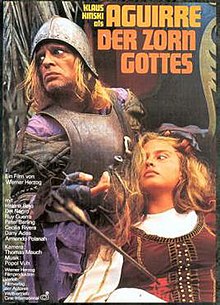AGUIRRE, THE WRATH OF GOD
Andean Insanity...
Aguirre: The Wrath of God is how Joseph Conrad's Heart of Darkness would have been like if it had taken place in South America, for has at its core an insane quest led by an insane man. The first collaboration between director Werner Herzog and actor Klaus Kinski, the film is a quiet journey into madness, chaos, destruction, and death.
Aguirre purports to tell the story of a doomed expedition into the Amazon. Spanish conquistador Gonzalo Pizarro sends a small group, led by Don Pedro de Ursua (Ruy Guerra), to search for El Dorado, a fabled city of untold riches. Over Pizarro's objection, two women join the expedition: Don Pedro's mistress, Doña Inez (Helena Rojo), and Flores (Cecilia Rivera), daughter of Ursua's second-in-command, Don Lope de Aguirre (Kinski).
It isn't long before Aguirre leads a coup against Ursua and places Don Pedro de Guzman (Peter Berling) the titled nobleman of the expedition as his puppet, naming him "Emperor of El Dorado". As they go further down the river, the members of the expedition grow more and more tired, hungry, and delusional. Yet they press on, driven by fear of Aguirre and their own gold-lust. Ultimately, the members slowly go mad and/or end up dead, with the now-totally insane Aguirre declaring himself ruler over all he surveys, with only monkeys to rule over.
The simultaneously massive and minimal nature of Aguirre, The Wrath of God is seen right at the opening. Accompanied by the brilliant music of musical group Popol Vuh. After a brief prologue, you slowly focus in on this group going down a mountain, these Spanish conquistadors and their Incan slaves, going further down the valley.
There is no dialogue in the opening save for the voiceover from monk Brother Gaspar (Del Negro), but Herzog's visuals capture more than what is spoken. We see the smallness of man against unconquered and perhaps unconquerable nature, the prospect of vast rewards blinding the expedition to their metaphorical and literal descent into a beautiful hell.
Aguirre, The Wrath of God showcases how a deranged drive will cause men to abandon reason. A brilliant example of this is after Don Fernando is proclaimed Emperor. Though he has no power whatsoever the expedition treats him as if he were an actual monarch. He is fed elegant food on the makeshift raft while the rest of the crew starves. Rational men would have forced a return to the main Spanish group, but greed and the fierce nature of Aguirre push them forward. This is as frightening a portrait of how men can delude themselves through a mixture of fear and in this case greed.
At the heart of Aguirre is Klaus Kinski's intense performance as the film's title character. His Aguirre is a methodical, plotting man, one who by his force of will forces everyone into line. He has a peculiar style of standing and walking which to me was reminiscent of Shakespeare's Richard III. Kinski never goes into histrionics, doesn't rave or foam at the mouth.
It's doubtful director Werner Herzog would have allowed Kinski to go into hysterics. The sparse style of Aguirre gives it almost a documentary feel, as if you are really there with the expedition, bringing you into the story and almost making you a part of it as opposed to being a mere observer. In some ways, Aguirre is a calm yet intense film, one that quietly lures you in the same way Aguirre lured the men into abandoning all reason.
Popol Vuh's score evokes otherworldly sounds that mix excellently with the Andean region and its native people. While there isn't much music in Aguirre, the music that there is provides the haunting atmosphere of men sinking into a madness of their own creation.
When I finished watching Aguirre: The Wrath of God a second time, I was reminded of Pete Seeger's Waist Deep in the Big Muddy, both telling the tale where despite all reason and chance to escape the journey goes further down into death. A haunting, dark film, anchored by a fiery performance by Klaus Kinski and the cool but sharp direction of Werner Herzog, Aguirre: The Wrath of God will continue to show us the darkness within all men.



No comments:
Post a Comment
Views are always welcome, but I would ask that no vulgarity be used. Any posts that contain foul language or are bigoted in any way will not be posted.
Thank you.